- Best overall VPN for gaming: Surfshark
- Best for fast VPN speeds: NordVPN
- Best for specialized gaming servers: CyberGhost VPN
- Best for region-locked games: Windscribe VPN
- Best for preventing DDoS attacks: Private Internet Access VPN
- Best for work and gaming: ExpressVPN
The video game industry is one of the most lucrative businesses in the world. A report from Statista says that just in 2022, video games garnered a worldwide revenue of almost $347 billion U.S. dollars — which is more than both the film and music industries combined.
Today, a large portion of the industry’s continued success is online gaming. With the rise of the internet, gaming media like e-sports, video game streamers and content creators, among others, have brought the industry to new heights. But as these businesses continue to grow, their reliance on the internet poses a few challenges.
For example, video game streamers can get hit by DDoS attacks that prevent them from streaming their game; or a video game journalism site may be unable to cover a new game due to geo-restrictions set by the publisher.
This is where virtual private networks, or VPNs, enter the picture. VPNs run your traffic through an encrypted connection and change your IP address location. This provides added security to your gaming business and helps you access geo-blocked content at the click of a button.
In this article, we take a look at the six best VPNs for gaming.
Featured Partners
Top VPNs for gaming comparison
When looking for a gaming VPN, our main consideration is the server network and locations. Since we’re dealing with online gaming, having a vast server network helps reduce the possible lag we may experience with running our connection through an additional tunnel.
| Software | No. of servers | Server locations | Simultaneous device connections | DDoS protection | Pricing (1-year plan) |
|---|---|---|---|---|---|
| Surfshark 4.6/5 stars | 3,200 | 100 countries | Unlimited | Yes | $3.99 per month |
| NordVPN 4.7/5 stars | 6,168 | 74 countries | 6 | Yes | $4.99 per month |
| CyberGhost VPN 4.3/5 stars | 9,000+ servers (reported) | 100 countries, 126 locations | 7 | Yes | $6.99 per month (6-month plan) |
| Windscribe VPN 3.5/5 stars | Around 500 (reported) | 69 countries | Unlimited | Yes | $5.75 per month; customizable plan |
| Private Internet Access VPN 4.2/5 stars | 10,000 - 35,000 (reported) | 91 countries | Unlimited | Yes | $3.33 per month |
| ExpressVPN 4.4/5 stars | 3,000 (reported) | 105 countries | 8 | Yes | $8.32 per month |

Surfshark is an all-around solution for any business looking for a gaming VPN. First, it provides fast-speed performance via a server suite with 3,200 servers across 100 countries. Second, it allows for an unlimited number of simultaneous device connections. This helps gamers and gaming businesses to protect as many PCs, smartphones and devices they want for just one subscription.
Finally, Surfshark is also one of the more affordable options on this list, making it a smart choice for small to large gaming-related businesses.
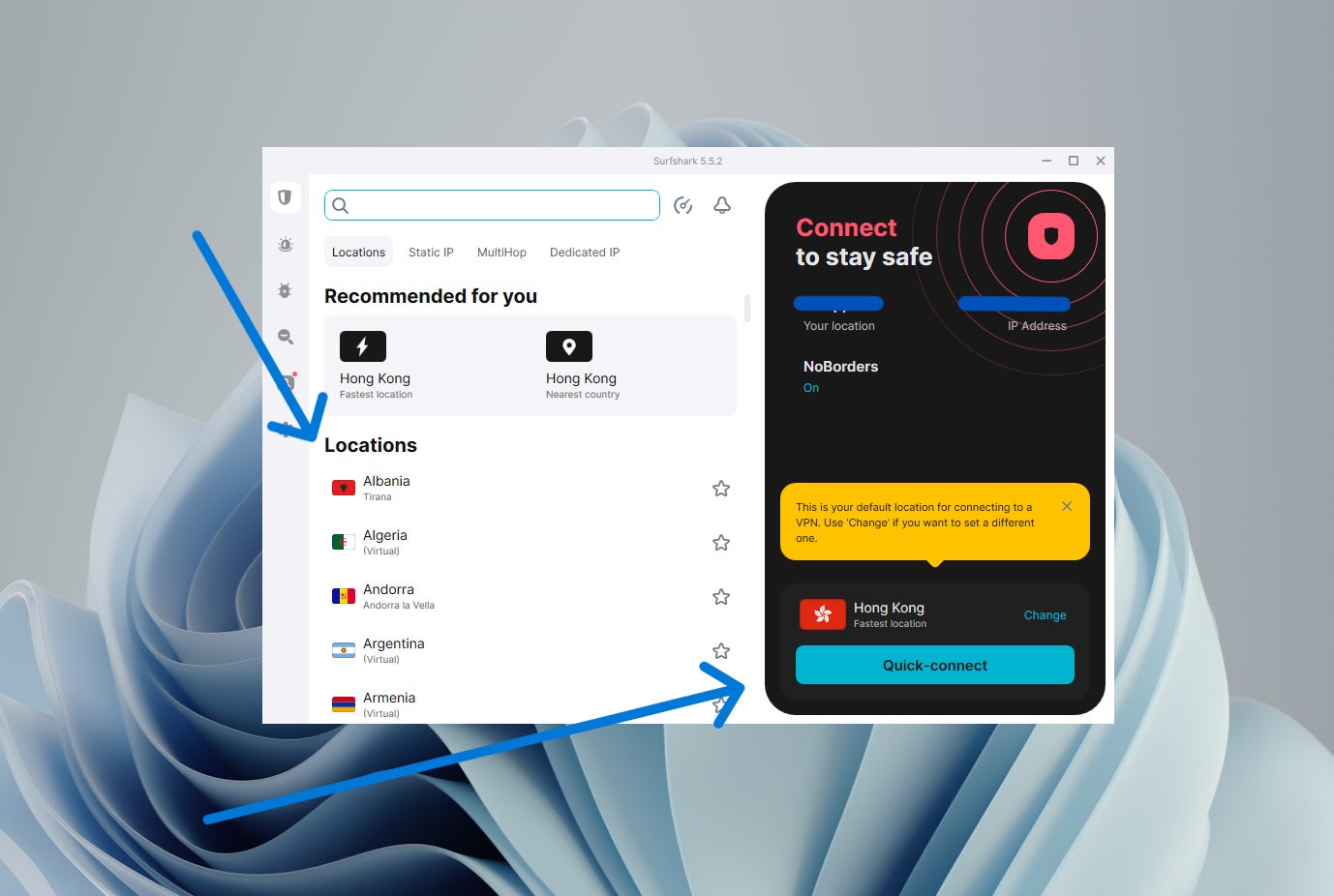
Why we chose Surfshark
Surfshark carved its place as the best overall VPN for gaming for its mix of fast VPN speed, unlimited number of device connections and low pricing. Gaming businesses that want an all-in-one VPN service should definitely consider Surfshark at the top of their list.
Pricing
Surfshark has three price tiers: Starter, One and One+. Since our main priority is to get Surfshark’s fast speeds and server fleet, I recommend going for Starter. It carries the main VPN service at the lowest possible cost. In comparison, One and One+ have higher prices with more advanced security features we don’t necessarily need.
Here’s a rundown of the three plan options for Surfshark Starter:
- Surfshark Starter: $15.45 per month for 1 month.
- Surfshark Starter: $2.79 per month for 1 year.
- Surfshark Starter: $2.19 per month for 2 years.
Features
- 3,200 servers across 100 countries.
- Unlimited simultaneous device connections.
- CleanWeb ad and tracker blocker.
- DNS leak protection.
- AES 256 encryption.
Pros
- Affordable pricing across most of its plans.
- Can protect multiple devices.
- Independently audited.
Cons
- No free version.
In our hands-on review, Surfshark VPN received a score of 4.6 out of 5 stars.

If speed is your top priority, I recommend NordVPN. With its network of 6,168 servers across 74 countries, gaming businesses will have no problem finding a server that gives them optimal speeds. When I tested NordVPN, I had a pleasant experience speed-wise. Both upload and download speeds performed well during my use — which is crucial for avoiding lag with online games.
Compared to Surfshark, NordVPN is slightly more expensive with its starting plan at $4.99 to Surfshark’s $3.99. That’s roughly $60 per year for NordVPN and around $50 for Surfshark. You also only get six simultaneous device connections with NordVPN to Surfshark’s unlimited connections.
If you only have one gaming machine and getting the best speed is absolutely important for you, I’d say the extra $10 is worth it.
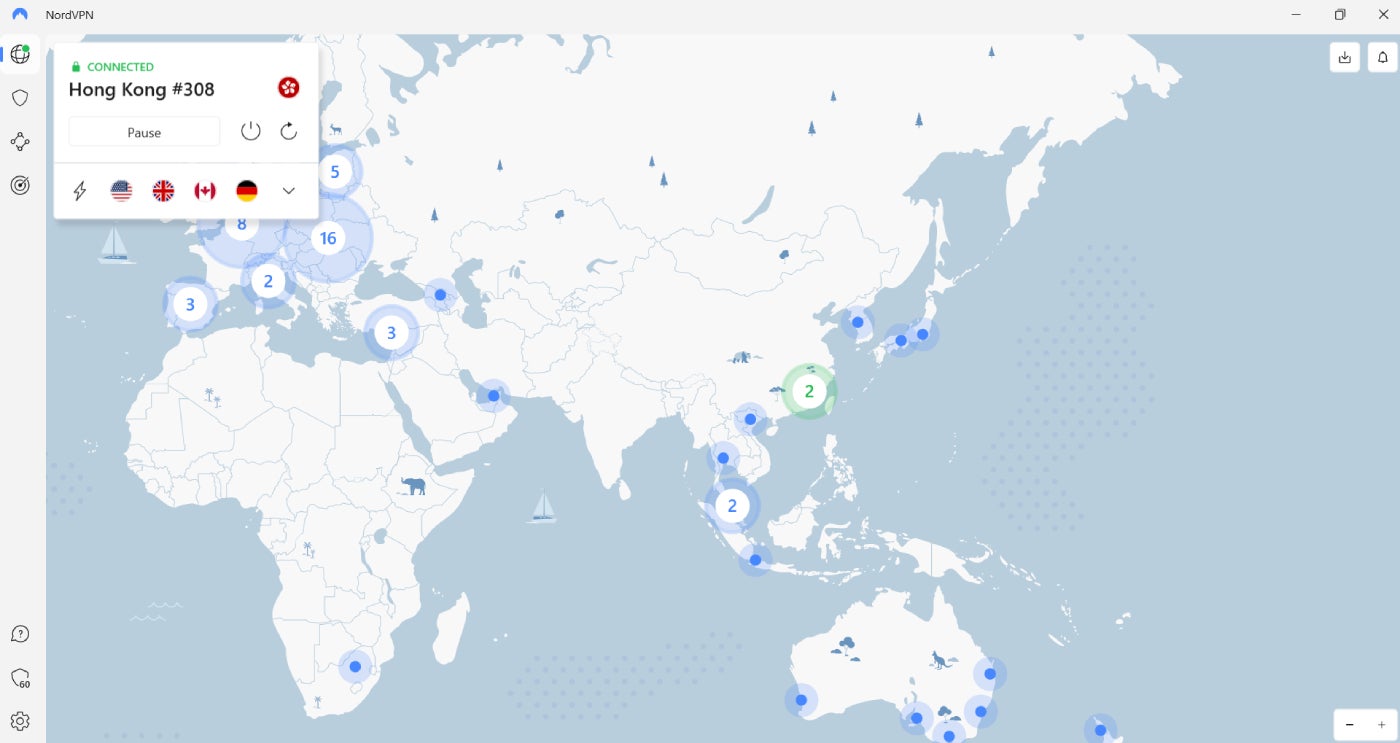
Why we chose NordVPN
I chose NordVPN for its fast-performing VPN connection and large server fleet. With over 6,000 servers to choose from, I envision NordVPN providing ideal speeds to gaming businesses regardless of where they are.
Pricing
NordVPN has three plans: Standard, Plus and Complete. For gamers, I encourage you to go for the Standard plan. It includes the main VPN service with threat protection against ads and malware.
Meanwhile, Plus and Complete include security features like data breach scanning and encrypted file storage — features we don’t really need for a gaming VPN.
Here’s an overview of NordVPN’s Standard tier prices:
- NordVPN Standard: $12.99 per month for 1 month.
- NordVPN Standard: $4.99 per month for 1 year.
- NordVPN Standard: $3.99 per month for 2 years.
Features
- 6,168 servers across 74 countries.
- Threat Protection against malware, trackers and ads.
- Meshnet encrypted file-sharing system.
- Dark web monitor.
Pros
- Wide range of security-focused servers.
- Reliable and fast VPN speeds.
- 7-day trial via Android app.
- Independently audited.
Cons
- A bit more expensive.
- No free version.
In our hands-on review, NordVPN received a score of 4.7 out of 5 stars.
For users who want an easy way to access gaming-optimized servers, CyberGhost VPN is the pick. CyberGhost VPN is one of the few VPNs on this list that smartly categorizes their VPN servers optimized for gaming. In fact, it has its own section on the CyberGhost app dashboard. This makes it much easier for gaming businesses to choose a VPN server that best suits their needs.
I particularly like how CyberGhost shows users the ping and distance of each particular server location (see Figure C).
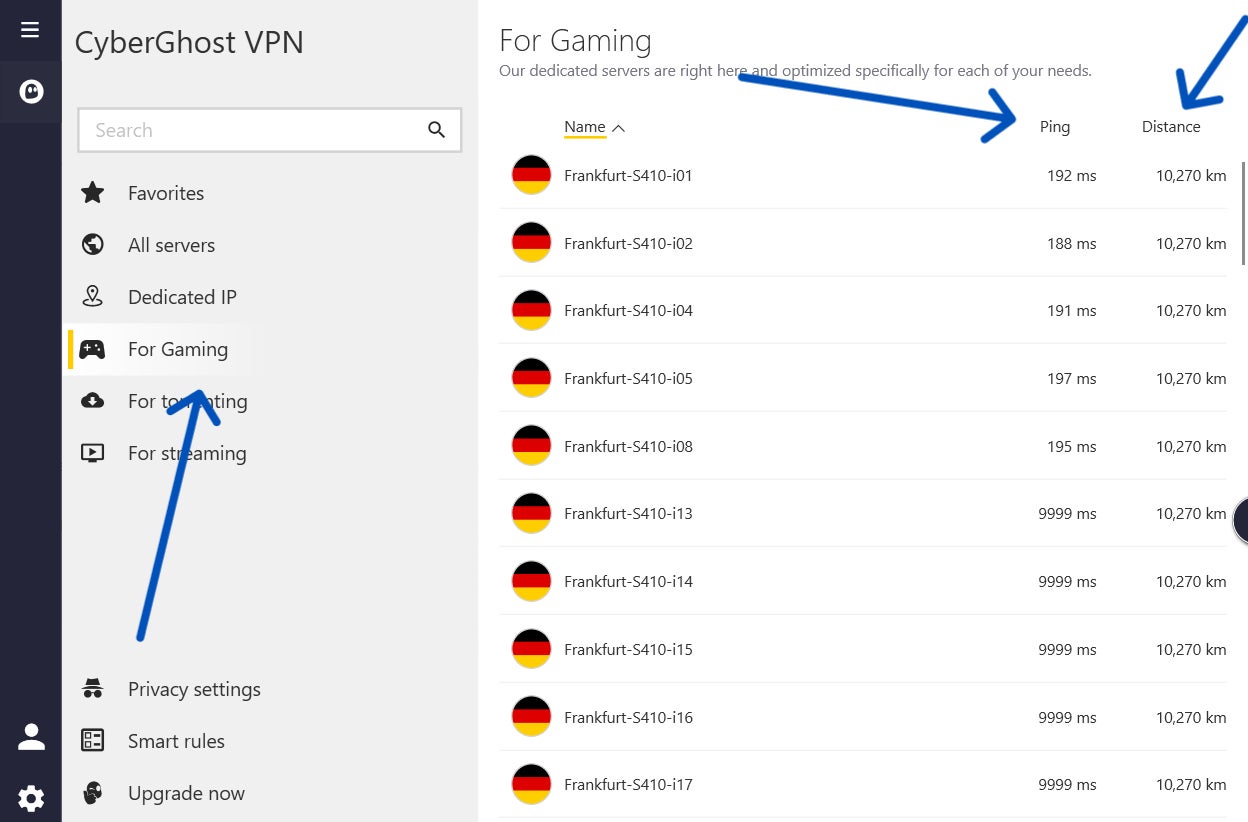
This gives users the ability to choose a server that provides them the lowest amount of latency and lag. On top of that, CyberGhost provides a big server network that offers servers across 126 locations and 100 countries.
Why we chose CyberGhost VPN
I selected CyberGhost for its easy-access For Gaming server list that saves gaming businesses the hassle of looking for optimal servers for gaming.
Pricing
CyberGhost VPN has simple pricing with three plans: a one-month, six-month and two-year subscription. Here are the prices for each below:
- CyberGhost VPN: $12.99 per month for 1 month.
- CyberGhost VPN: $6.99 per month for 6 months.
- CyberGhost VPN: $2.19 per month for 2 years.
Features
- Gaming-optimized servers on the home screen.
- Servers from 126 locations.
- RAM-only servers.
- Smart Rules automated actions panel.
Pros
- Gaming section shows server ping and distance.
- 45-day money-back guarantee.
- Affordable 2-year plan.
Cons
- Six-month plan is pricey.
- No annual subscription.
In our hands-on review, CyberGhost VPN received a score of 4.3 out of 5 stars.

If you’re looking to access region-blocked games, I suggest going for Windscribe VPN. Windscribe has a unique Build-a-Plan subscription that allows users to customize which locations they want included in their contract. This can be useful for gamers who only need access to games from particular regions. Gacha games are a prime example, where some titles are only available in countries like Japan. In other cases, early access to games are locked to certain regions as well.
With Windscribe’s Build-a-Plan, you can create a customized plan to fit your particular gaming business’ needs. At $1 per location per month, gacha game content creators or gaming media sites that need access to only one region will only have to spend a dollar to do so.
Fortunately, even if you choose just one server location, Windscribe still provides you with unlimited data on that server of choice.
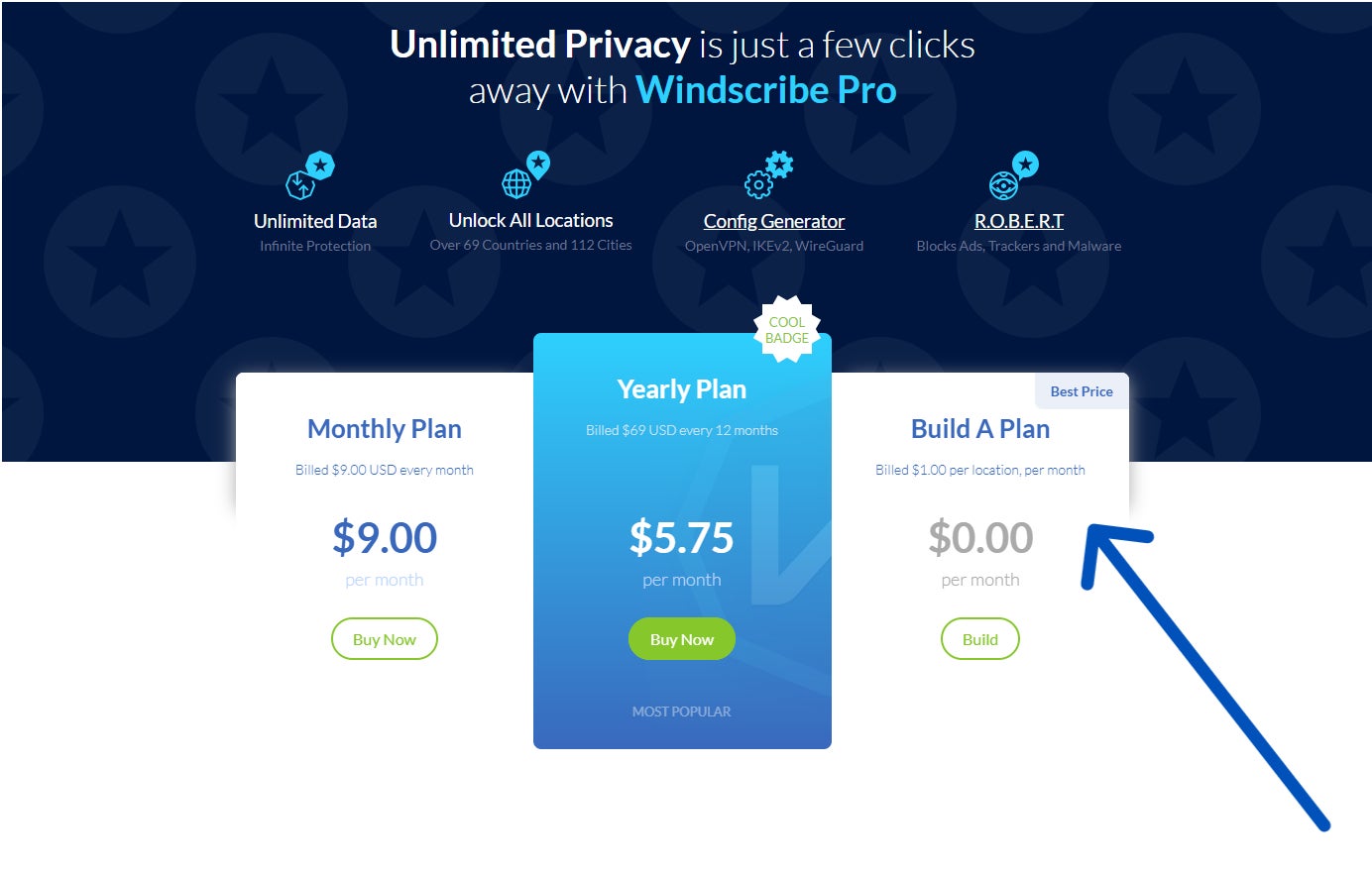
Why we chose Windscribe
I chose Windscribe for its practical Build-a-Plan subscription that I find to be a good investment for gamers who only need a particular VPN server location to unblock geo-restricted games.
Pricing
Windscribe has a free version and three paid plans. Its free version provides 2GB of monthly data and 10GB if you provide your email address. On the other hand, its paid plans are divided into a monthly, yearly and customized subscription.
- Windscribe Pro: $9.00 per month.
- Windscribe Pro: $5.75 per month for 1 year.
- Windscribe Pro Build A Plan: $1.00 per location per month.
Features
- Build-a-Plan subscription option.
- Server network from 69 countries and 134 cities.
- Built-in IP and ad blocker.
- Unlimited device connections.
Pros
- Customizable plan that lets you select specific server locations.
- Free version
- Can protect multiple devices at no additional cost.
Cons
- VPN speed can be spotty at times.
- Lack of published independent security audit.
In our hands-on review, Windscribe VPN received a score of 3.5 out of 5 stars.

For users who want protection against DDoS attacks, I recommend Private Internet Access (PIA) VPN. For those unaware, a DDoS or distributed denial of service attack is when a threat actor overloads a server with internet traffic — eventually causing the victim’s network connection to drop.
DDoS attacks are common in online games like Call of Duty and GTA Online, with attackers targeting other players’ IP addresses to disconnect them from the game. Luckily, VPNs like PIA VPN are specifically designed to address such issues.
With PIA VPN’s massive server network spanning 91 countries, online gamers can route their traffic through a PIA VPN server, hide their IP address and prevent DDoS attacks from affecting their business.
In addition, gamers can expect fast performance and low ping with PIA VPN. During my testing, PIA VPN delivered fast internet speed for 4K video streaming and online browsing. Thus, I imagine it’ll bring similar performance for online gaming.
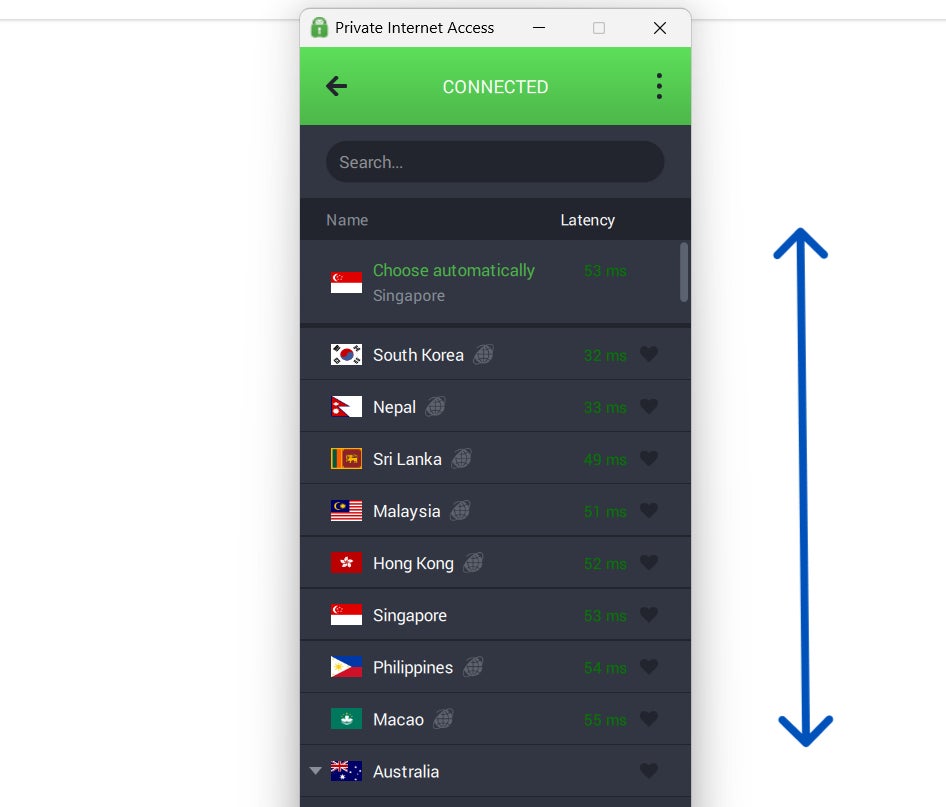
Why we chose Private Internet Access VPN
I picked PIA VPN due to its compelling package as a VPN used to protect against DDoS attacks. The combination of its large server network, reportedly comprising 10,000 to 30,000 servers across 91 countries, and affordable annual subscription makes it a smart choice for gamers who have dealt with DDoS attacks before.
Pricing
- PIA VPN: $11.95 per month for 1 month.
- PIA VPN: $3.33 per month for 1 year.
- PIA VPN: $2.03 per month for 3 years.
Features
- Server network across 91 countries.
- User-customizable app interface.
- Unlimited device connections.
- RAM-only servers.
Pros
- Affordable annual plan.
- Protects against DDoS attacks.
- Fast VPN speeds.
Cons
- No free version.
- WireGuard protocol can be buggy at times.
In our hands-on review, PIA VPN received a score of 4.2 out of 5 stars.

If you’re someone who needs a VPN for work and gaming, I recommend ExpressVPN. It’s a no-nonsense VPN that’s easy to use and provides consistent and fast speeds. Its user interface (UI) is one of my personal favorites, offering a clean and modern design that makes for a pleasant app experience.
With this simple and intuitive UI, I find ExpressVPN to be a great choice for users who want a single VPN solution for both work and play.
In particular, I like how its browser extension controls the full-featured VPN app and doesn’t just protect your browser traffic (see Figure F). This makes it easier to start up a VPN connection from the browser — be it before you start working or before you load up your favorite online game.
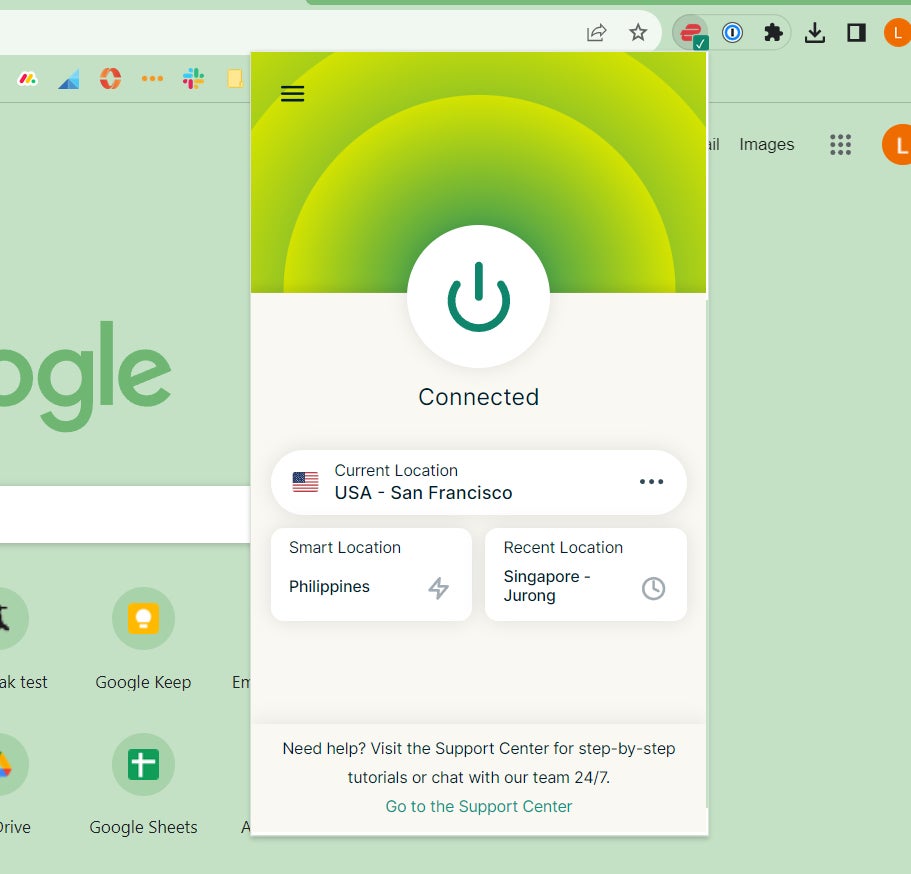
Why we chose ExpressVPN
I chose ExpressVPN for its pleasant user interface and smart browser extension. These two attributes make Express a smart option for users looking at a VPN that can seamlessly work for both work and gaming — especially since the main VPN app can be activated right from the browser.
Pricing
ExpressVPN has three subscription tiers: a monthly, 6-month and annual subscription.
- ExpressVPN: $12.95 per month.
- ExpressVPN: $9.99 per month for 6 months.
- ExpressVPN: $8.32 per month for 1 year.
Features
- Servers spread across 105 countries.
- 8 simultaneous device connections.
- TrustedServer RAM-only server tech.
- AES-256 encryption.
Pros
- Modern and well-designed user interface.
- Consistently fast performance.
- Impressive portfolio of third-party security audits.
Cons
- Expensive.
- Lacks longer subscription option.
In our hands-on review, ExpressVPN received a score of 4.4 out of 5 stars.
How do I choose the best VPN for gaming?
Choosing the best VPN for gaming will largely depend on what type of gaming business you have and your particular circumstances.
If you’re a media entity or a gaming journalism site that needs access to region-locked games, it’s best to look into VPNs that offer server locations for that particular region. A common example here is Japan, where some video games are only accessible via a Japanese server.
For these cases, I also recommend choosing a VPN that has numerous servers for the specific region you need. This gives you flexibility to choose from a set of servers, especially if one server is receiving higher traffic than others.
Gaming-related businesses can also benefit from choosing a VPN that allows for multiple simultaneous device connections. This will let you have multiple PCs or consoles connected to the VPN — whether it’s for covering a new game or testing out a beta release.
If you’re a video game streamer or a video game content creator, investing in a VPN to protect against DDoS attack is a practical move. Having the ability to change your IP address can save you the stress of being unexpectedly disconnected from your game through a DDoS attack.
In particular, content creators who play games like Overwatch, Call of Duty, Grand Theft Auto Online and other online multiplayer games should definitely consider purchasing a VPN subscription for this reason.
For gaming businesses worried about VPNs slowing down your online game’s connection, there’s no need to worry. While VPNs can technically slow down your internet connection, most modern VPNs will have a negligible effect on your game’s ping and overall gaming performance.
With that being said, a good rule of thumb for a gaming VPN is picking one with a large server network. The main bottleneck to a VPN’s speed is the distance between you and the VPN server’s location. The more servers in a network, the higher the chance of getting a server near where you are.
Fortunately, almost all the options I recommended above have decently sized server networks and/or a geographically diverse set of locations.
Review methodology
In this rundown of the six best virtual private networks for gaming, I prioritized looking for VPNs that can benefit gaming businesses and online gamers.
In particular, I looked at VPN server networks, the number of device connections allowed and DDoS attack protection, among others.
I evaluated each product through a combination of first-hand experience and comprehensive research of its features. This involved doing a detailed comparison of each VPN’s features and how they fared against each other.
I have also conducted full reviews of each VPN featured. My findings from these individual reviews were used to supplement my analysis for this article.
I also analyzed user testimonials and third-party reviews to help round out my final recommendations. This involved looking at real user feedback and consulting with TechRepublic community members through our official forum for their thoughts on the topic.
I also considered what VPNs were best for specific use-cases, particularly with regards to gaming and gaming-focused businesses.






